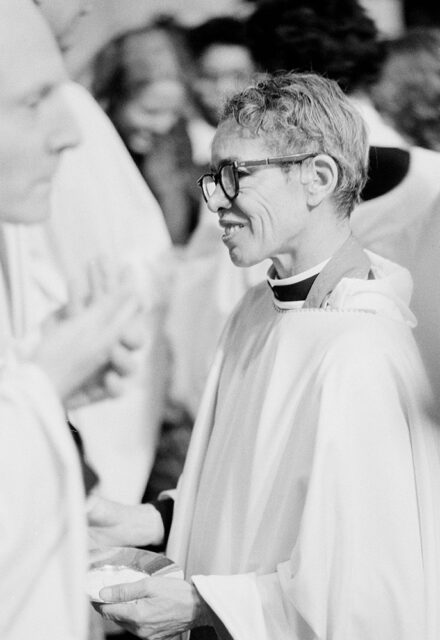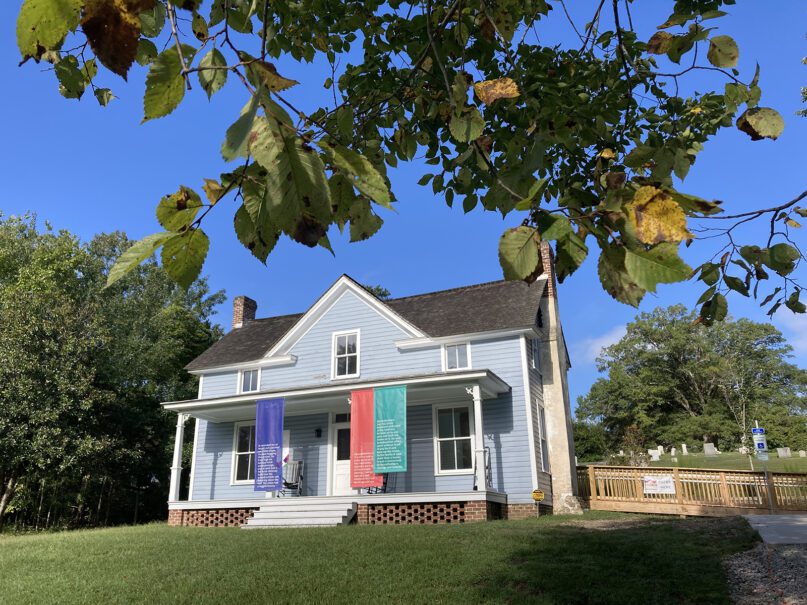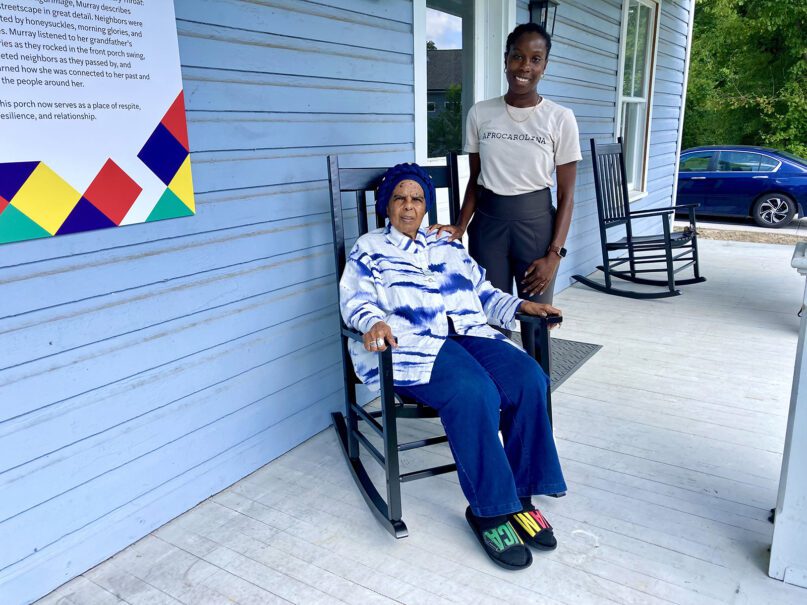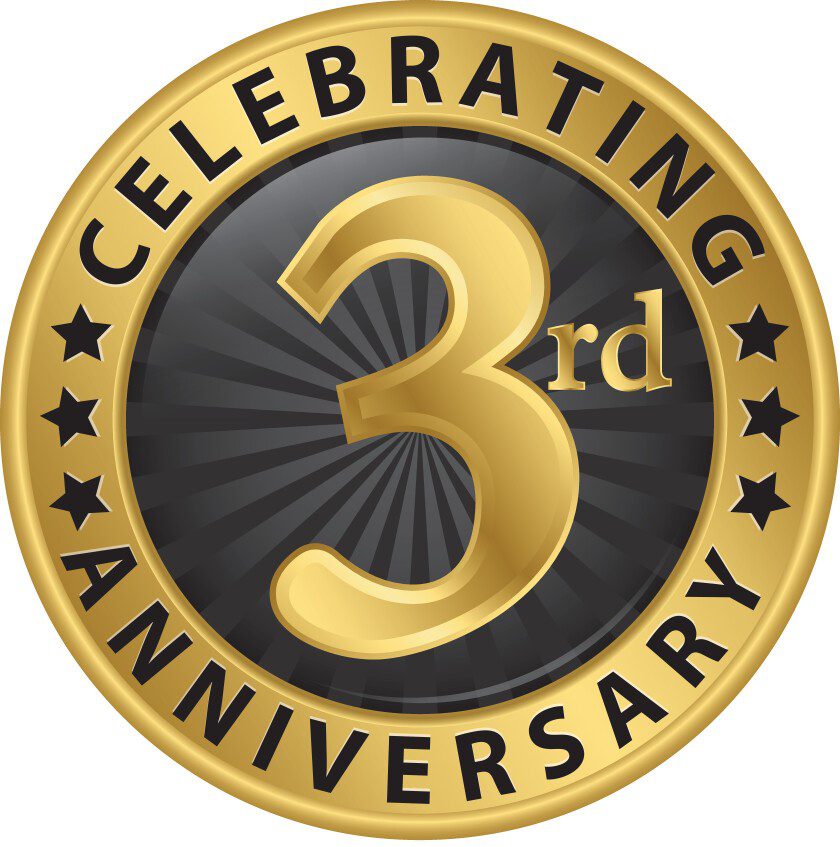Known as the Pauli Murray Center for History and Social Justice, the refurbished two-story clapboard home will further the kind of progressive social causes Murray, who died in 1985, championed.
By Yonat Shimron
DURHAM, N.C. (RNS) — In 2018, the Episcopal Church named the Rev. Pauli Murray, its first Black female priest, a saint.
In 2021, a documentary film, “My Name Is Pauli Murray,” premiered at Sundance and was later acquired by Amazon.
In 2023, the U.S. Mint chose the priest, who was also a lawyer and civil rights activist, as one of five honorees to appear in a special edition of the U.S. quarter.
Now the childhood home where Murray grew up in Durham, North Carolina, officially opens after 12 years of renovations. Known as the Pauli Murray Center for History and Social Justice, it is yet another site in the multiplying spaces where the trailblazing activist is finally being recognized. The refurbished two-story clapboard home, built by Murray’s grandfather in 1898, was designated a National Historic Landmark in 2016. With donations of $1.2 million for its rehabilitation, it will now anchor a set of initiatives its governing nonprofit board hopes will further the kind of progressive social causes Murray championed before dying in 1985.

“We will invite people into this space to learn about the life, legacy and work of the Reverend Dr. Pauli Murray,” said Angela Thorpe Mason, the center’s executive director. “But we’re using that as a means to invite and catalyze people to move contemporary social change work forward in their communities.”
Murray may be best known as a civil rights activist who helped shape the legal argument for the 1954 Brown v. Board of Education Supreme Court ruling. In a final law school paper at Howard University School of Law, Murray wrote that “separate” could never be “equal.” In 1951, Murray published a book on segregation laws that Thurgood Marshall — who argued the Brown case before the high court and later became a Supreme Court justice himself — credited as “the bible of the civil rights movement.”

Ruth Bader Ginsburg, before she became a Supreme Court justice, also credited Murray’s arguments. Ginsburg named Murray in a legal brief she wrote while arguing a 1971 Supreme Court case that banned gender discrimination based on the 14th Amendment’s equal protection clause.
Not content with a rich legal career — Murray was good friends with former first lady Eleanor Roosevelt — the civil rights leader applied to General Theological Seminary in New York City and was ordained a priest in 1977 at the age of 66.
“Here’s a person with a degree from a seminary who’s been an Episcopalian all her life and who is a brilliant professional and she never really got to have a congregation or make the kind of impact she could have made if she had had the opportunity to really be the rector and all,” said her niece, Rosita Stevens-Holsey of Upper Marlboro, Maryland, one of Murray’s last surviving relatives.
Many scholars now recognize that Murray was also gender-nonconforming. Murray sometimes presented as a woman and sometimes as a man. Feeling trapped in a woman’s body, Murray begged doctors to prescribe hormone therapy. They refused. In the new center, Murray is referred to with “they/them” pronouns.
The newly opened center, which will conduct tours and hold lectures and film screenings, will also honor Murray’s struggles with gender and sex. In partnership with the North Carolina Bar Foundation, the center will provide pro bono legal services as part of a Name and Gender Marker Change Clinic.
“Law students and attorneys will provide pro bono services to members of our LGBTQ community as they seek to change their names and genders, which is oftentimes a very complicated and long and expensive legal process,” Mason said. “This will illuminate Pauli’s work as an attorney, as a member of the LGBTQ community, as somebody who in the 2020s, we understand as gender nonconforming.”
The center sits in Durham’s West End, a historically Black working-class neighborhood that abuts Durham’s largest cemetery. Until a few years ago, many of the homes there, including the Pauli Murray house, were slated for demolition. Though technically abandoned, squatters were living in the house until 2011 when a coalition, the Central Durham Quality of Life Project, saved it. The center was officially created a year later.
Born in Baltimore, Murray wrote lovingly about the Durham house in her 1956 autobiographical book “Proud Shoes.” Murray moved into the home in 1914, at the age of 4, after their mother died. The second story has two bedrooms; one for Murray’s grandparents and the other that Murray shared with their aunt, Pauline Fitzgerald Dame. The family attended St. Titus Episcopal Church, a historically Black church, about two miles east.

The center has few of Murray’s personal belongings, but it does feature one of Murray’s three typewriters. “One person plus one typewriter constitutes a movement,” Murray once wrote.
Stevens-Holsey, Murray’s niece, said she was thankful that Murray grew up with her grandparents and aunt in the Jim Crow South.
“What Aunt Pauli observed here, what she lived through here, what she liked and didn’t like from her experiences here, made her the person that she was,” said Stevens-Holsey, who wrote “Pauli Murray: The Life of a Pioneering Feminist and Civil Rights Activist,” a Young Adult biography of her aunt. “I thank Durham for that, because she wouldn’t have been, in my mind, the advocate, the legal theorist, the person that she was, had she not lived here and gone through what she did.”
First Published on Sept. 6, 2024


